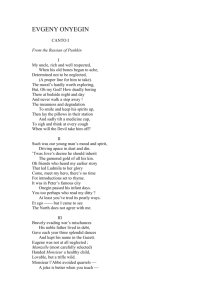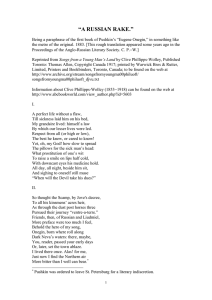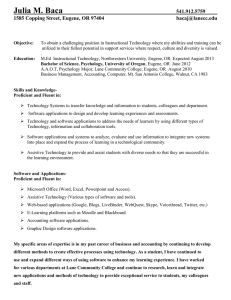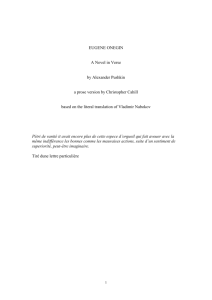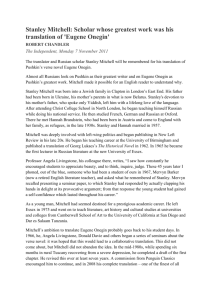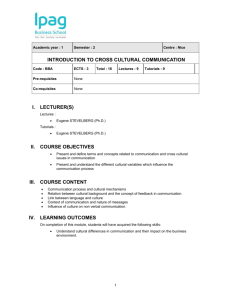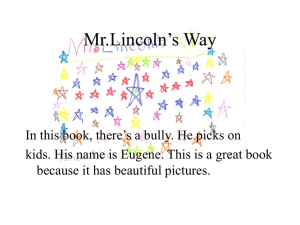Corré
advertisement
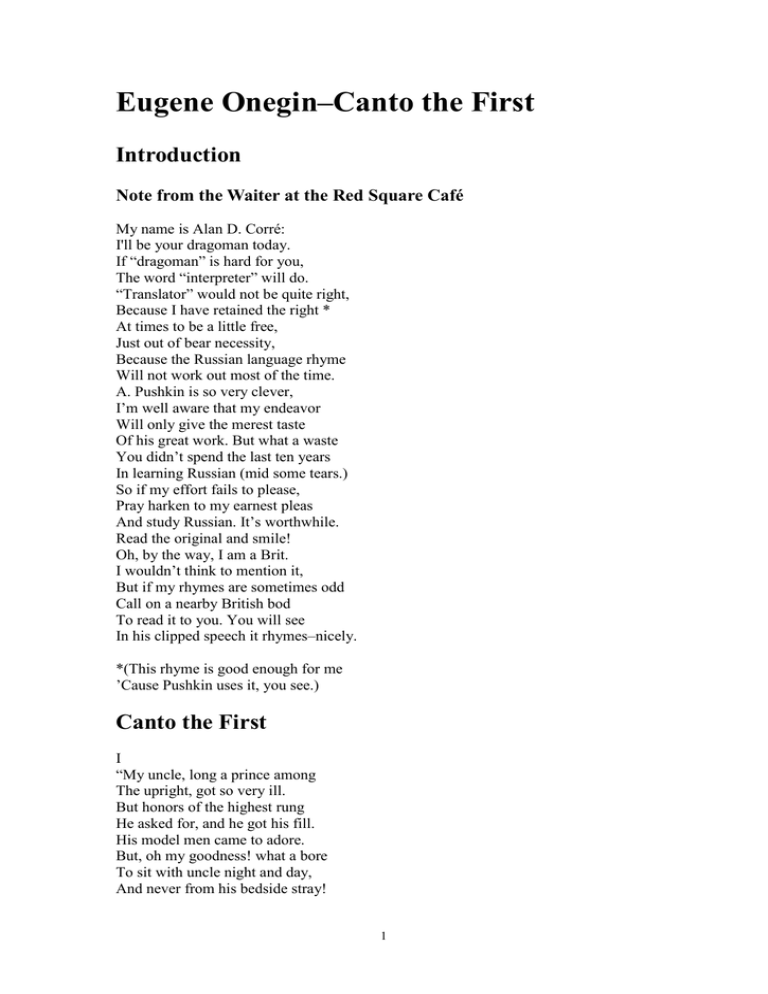
Eugene Onegin–Canto the First Introduction Note from the Waiter at the Red Square Café My name is Alan D. Corré: I'll be your dragoman today. If “dragoman” is hard for you, The word “interpreter” will do. “Translator” would not be quite right, Because I have retained the right * At times to be a little free, Just out of bear necessity, Because the Russian language rhyme Will not work out most of the time. A. Pushkin is so very clever, I’m well aware that my endeavor Will only give the merest taste Of his great work. But what a waste You didn’t spend the last ten years In learning Russian (mid some tears.) So if my effort fails to please, Pray harken to my earnest pleas And study Russian. It’s worthwhile. Read the original and smile! Oh, by the way, I am a Brit. I wouldn’t think to mention it, But if my rhymes are sometimes odd Call on a nearby British bod To read it to you. You will see In his clipped speech it rhymes–nicely. *(This rhyme is good enough for me ’Cause Pushkin uses it, you see.) Canto the First I “My uncle, long a prince among The upright, got so very ill. But honors of the highest rung He asked for, and he got his fill. His model men came to adore. But, oh my goodness! what a bore To sit with uncle night and day, And never from his bedside stray! 1 What an awful, low-down scene His half-dead person to amuse, Arrange his pillows, and to choose Lugubriously his medicine, While sighing in sad undertones: ‘When will old Nick consume your bones?’” II Thus thought this scamp, the patent heir Of all his forbears, by decree Of Zeus, as through the dusty air He rode a stagecoach for a fee. O friends of Ruslan and Ludmilla!1 Be pleased to meet this gallant feller, The hero of my humble tale Without ado and without fail: Eugene Onegin, my good friend, Came to this world on Neva's bank, Where maybe one time you too sank Your roots, or bright refulgence send. There formerly I also strolled, But cannot bear that northern cold. III His father lived in debt, you see, And threw three grand balls every year. He served extremely nobly, But bankruptcy at last came near. Eugene was saved by kindly Fate, Madame2 watched o’er him, soon and late. Monsieur then took the tutor's seat– The child was sharp, but very sweet. Monsieur l'Abbé, a Frenchman halt,3 Did not much care to tire the child, His way with him was always mild, Reproved in him no moral fault, His youthful pranks he'd overlook, And take him to a pleasure nook.4 IV To Eugene, now a stylish lad, There came his young, rebellious years, 1 Ruslan and Ludmila (1820): a romantic poem by Pushkin which secured his reputation thirteen years before Onegin. It tells how Ruslan rescued his bride, daughter of the Grand Prince of Kiev, from a wicked magician who kidnapped her on her wedding night. The Russian composer Mikail Glinka wrote an influential opera on this theme (1842.) 2 His governess 3 Halt: an archaic meaning of the Russian word, which I have translated by an archaic English word (=lame). The word may also mean “wretched.” 4 i.e. the summer park in St. Petersburg. 2 His time of hopes and longings sad. Monsieur they threw out on his ears. Onegin now is fully free! His locks are styled so modishly! He entered high society, A London toff for all to see. His language was the tongue of France; He spoke and wrote it as one should. The gracious bow he understood. A light mazurka he could dance. What more to say? Society said That he was smart, and so well-bred. V We all of us have set our mind To study something or another. In erudition, God being kind, To seem to shine is no great bother. Of many people it’s the view– Of judgment strict, decisive too– Onegin’s brain is nothing great, But he can freely spew a spate Of learned words (he knows a lot) Anent whatever thing you please– Parades opinions like a breeze, Stays quiet when things get really hot– Delights the women with a flow Of unexpected, sharp bons mots. VI The day of Latin has now passed. So if it's truth we want to tell, His Latin reached the point at last To parse the epigraphs quite well. He finished letters up with “Vale!”5 Discussed a Juvenalian6 sally; And could repeat a verse or two Of Virgil (with mistakes.) He knew He had no love for research notes, To rummage in the trash of time To get a backward glimpse sublime Of history. But anecdotes From Romulus to our own day He kept in mind and could relay. VII Onegin saw no reason why He should give life for poetry. He could not tell, though he might try, An iambus from a trochee. 5 6 Goodbye. (Latin.) Juvenal: Roman satirical poet, 60140 C.E. 3 He brushed off Homer, Theocrit,7 Preferred to study Adam Smith,8 Became a scholar deep and sage In economics. He could gauge The reason nations great wealth found, On what they lived, the answer why They need no gold to multiply When simple products are around. His father could not understand Him; took a mortgage on his land. VIII The other things which Eugene knew I have no time to tell you here. But one hard science he could do, And in that one he had no peer. For him it was, from youngest days, A labor, torture, cause for praise– For every day it would possess Onegin’s dreary idleness– The science that I mean was fond, Strong passion of which Naso9 sang, And came to end his Sturm und Drang A suffering rebel held in bond In Moldau’s steppes, not Italy, Far from the place he longed to see. IX … X He early learned hypocrisy, Disbelieved and made believe, Concealed a hope, felt jealousy, Appeared indifferent or attentive. Now somber, sad, or bored to death, Now proud, now humbly holding breath, He could be silent languidly, Or eloquent most ardently. To billets doux he would not render Homage; liked this, savored that, And took with them a little nap. His gaze was sometimes quick, now tender, 7 Theocritus: Greek pastoral poet, third century, B.C.E. Adam Smith: Scottish political economist, 17231790, author of The Wealth of Nations. 9 Publius Ovidius Naso, (43 B.C.E.17 C.E.), known in English as Ovid, was the great Roman love poet, known for his Ars Amatoria and Metamorphoses. In the year 8 C.E., the Emperor Augustus relegated him to Tomis, near modern Constanta, Romania, for an unknown offense, although it is thought to be related to the adultery of the Emperor’s granddaughter. His exile was very bitter, but he was never allowed to return to Rome, despite his pleas. 8 4 Now shy, now bold. Once in a while A docile tear would chase his smile. XI Contemporary man is he! His grim despair could terrify. He jokes about virginity, Amuses with fine flattery, Emotion senses, straightway clears The prejudice of virgin years; By sense and passion ardently Demands attention instantly. He overhears the heart’s first cry, Then love pursues, and with a sigh A rendezvous gets presently; And after that a darkling date, While giving lessons tête-à-tête! XII Young as he was, he troubled sore The hearts of regular coquettes. His rival he would swiftly floor With bitter venom; and he gets The meed of spiteful words and snares Gainst any man who rashly dares Oppose him. Husbands, unaware, Remained his friends without a care. A crafty spouse would fondle him– A longtime student of Faublas10– Or yet a hoary head grandpa– A cuckold with his horns so trim– Were all quite ready (’pon my life!) To offer dinner–and the wife! XIII XIV … XV Behold our Eugene yet abed. The invitations come apace. “What, who’s inviting now?” he said. Three missives summon to their place. A soirée there, a party here– So childish, but he must appear. Where shall he start? Unhappy he! To take them all just cannot be. Meantime, he dons his morning coat; A high hat places on his head. His horse the boulevard will tread, And freely range till Eugene note 10 A novel Les Amours du Chevalier de Faublas (Paris, 1787-1793) by the Girondist Jean-Baptiste Louvet de Couvrai, three volumes. 5 (Helped by his vigilant bréguet11) That time has come for lunch today. XVI Night fell. He climbs into the sleigh. “Gee up!” The driver’s cry rings out. His beaver collar’s silver-gray With icy dust from winter's clout. He hastes to Talon’s dining rooms; Kaverin’s presence there assumes. He enters: corks to ceiling fly Like comets with a tail they hie Of bubbly. Roast beef, bloody, hot– Luxurious truffles for young years– The best of French cuisine appears! And Strasbourg pies which never rot, Sharp Limburger, a living12 cheese, And golden pineapples that please. XVII His thirst demands another cup To cut the steaks’ and chops’ hot fat. His bréguet, though, now wakes him up: The new ballet is where it’s at! Onegin runs to see the show: His word there’s law, or yes or no. They know all his inconstancies: He loves and leaves the actresses, A denizen of each backstage. The audience will shout: Hurrah! Be quick to cheer an entrechat,13 Heckle Phaedra,14 show their rage At Cleopatra; Moëna call Just to hear his voice; that’s all. XVIII Land of enchantment! Years ago, Bold lord of satire Fonvizin15 Shone forth in quest of freedom so Likewise too did Knyazhnin. There Ozerov shared plaudits wild (As people wept while yet they smiled). Young Semenova also thrived. There's our Katenin who revived 11 A watch made by Abraham-Louis Bréguet (d. 1823) the greatest French horologist of his time. 12 living: because the more worms it had, the better. 13 A complex leap in ballet. 14 Phèdre, the great tragedy by Racine (1677.)The reference to Cleopatra is probably Shakespeare's “Antony and Cleopatra.” 15 Denis Ivanovich Fonvizin (1745--1792): wrote comedies ridiculing the inept aping of French manners and speech; author of Negros’ “The Young Oaf.” 6 The glorious talent of Corneille;16 There’s Shakhovskóy with biting wit Played comedies and made a hit. There Didelot17 was distingué. And I too frequented the plays, And in the wings spent my best days. XIX My goddesses! What's up? Where are you? To my despondent voice give heed. Are you still there? Do others bar you, Replace you, to your throne succeed? Your choruses I long to hear– I long to see a dancer near Perform with Russian soul ablaze Her flights. Or will my saddened gaze Familiar sights see nevermore? Shall I then raise a tart lorgnette, A joyless viewer of this set That's little other than a bore? A wordless yawn can I suppress, When I recall long gone success? XX The theater’s full! Its boxes glitter, The pit and stalls resound with bustle, The gallery is all a-twitter. They raise the curtain with a rustle. There half-above and half-below Obedient to the magic bow Stands splendid Istomina. Lo! Her nymphs around her nimbly go. With one sure foot she touches ground, And now she leaps and now she flies, As down flies up when Aeol18 sighs. Her other foot then spins around, Her body twists and then unwinds, As one swift leg its fellow finds. XXI They all applaud. Here comes Eugene: Thwart patrons’ knees he pushes by. His glass surveys askance the scene, For dames unknown now meet his eye. The circles all next bear his gaze: Their raiment, faces, vile displays Displease him. To the men he bows Around, and then his eyes allows 16 Pierre Corneille (1606--1684): great French dramatist, author of Le Cid. Didelot;He worked many years in St. Petersburg, and produced numerous notable ballets. 18 Aeol:In Greek mythology the god Aeolus is ruler of the winds. 17 7 Distractedly to view the stage. He turns aside, begins to yawn And says: “’Tis time for a new dawn, Ere boring ballet make me rage. ’Tis far too long! I’ve had enough! E’en Didelot I would rebuff!” XXII And while the Cupids, devils, snakes Upon the stage cavort and roar, The fur-wrapt lackey slily takes His forty winks at entrance door. The servants keep on stamping, flapping, Coughing, shushing, blowing, clapping; The lanterns shine out everywhere, Outside, inside, and here and there. The horses, frozen in such weather, Are frantic, champing at the bit; The coachmen round a bright fire sit, And curse their lords, clap hands together. Onegin leaves all this behind– He hurries home, fresh clothes to find. XXIII Will you permit me to display The solitary easement lieu, Wherein my model protegé Is dressed, undressed, and dressed anew? Behold the whims on every side Punctilious London can provide, All sent to us through forests lush And Baltic waves and northern slush. Behold all things so à la mode From Paris, tasteful, comforting, De luxe and languid, disporting, Contrived to furnish this abode. Such beauty as is seldom seen, All for our hero, age eighteen. XXIV Lo, ambered pipes from Tsaregrad, And china, bronze too, on a table; Of coddled sense the comfort glad– Perfumes enclosèd in cut crystal; Some little combs and little clippers, And straight and crooked little scissors; And tiny brushes to the tale Of thirty, for the tooth and nail. Oh, by the way, our good Rousseau Could not conceive how pompous Grimm19 19 Grimm Friedrich Melchior, Freiherr von Grimm (1723-1807): Swedish-born French 8 Durst clean his nails in front of him! (Grimm’s eloquent and mad, you know.) In this Rousseau who loved the right, I’m sad to say just wasn’t right.20 XXV You can be fully sensible, Yet think about your lovely nails. Why fight the times, though risible? Among mankind the rule prevails. Like Chadaev, my friend Eugene By jealous eyes might well be seen. He greatly feared his neighbor’s gaze, So was a dandy in his ways. Three hours daily he would spend With looking-glasses, more or less; Immaculate went out in dress, Like vesperal Venus at the end, When, putting on her male array, She gives a heavenly display. XXVI I have just drawn your nosey gaze To toilets of the latest rage. And clothing of the newest craze I might describe upon this page. But I’ve a problem. Pray forgive– I have no good alternative– The words gilet, froc, pantalon,21 Are absent from my Russian tongue.22 My style, already poor enough, Will be yet worse, if I should use These foreign words to state my views, And you would surely think it rough. The dictionaries I might search, But still they leave me in the lurch. XXVII Is that our subject? Not at all. So let’s grab too a hired coach, Like Eugene, rushing to the ball, All headlong, hurrying, abroach. We pass the sleepy houses dark, Along the street, so silent, stark. The lanterns of the carriage bright critic, who edited a cultural newsletter for foreign sovereigns. He was well known to Diderot and Rousseau. 20 Pushkin rhymes prav, the genitive plural of pravo “rights” with prav, the short form of the adjective pravyj, “right.” 21 i.e. vest, tail-coat, pantaloons (French.) 22 The Russian language, devoid of French purism, borrowed many French, German, Dutch, and English words to cover all kinds of new-fangled inventions. 9 Pour out a cheerful, happy light, And make small rainbows on the snow. Look, see right there a splendid home, Strewn with lampions in the gloam. Past solid windows profiles go; We get a hasty aperçu Of dolled-up cranks, and ladies too. XXVIII Our hero in the entrance hall Flew like an arrow past the guard, Ran up the steps marmoreal. His hand ensured his locks weren't marred. A dance floor full of folk he found; The music had begun to sound. A Polish dance engaged the crowd; The throng was huge, the music, loud. The horse guards’ spurs made merry ring. Dear women threw their legs around, As–not to their surprise–they found The men were frankly ogling. The modish women’s jealous hum By violins was rendered dumb. XXIX In my young days of love and fun, I went bananas for a ball. But memoirs here must stay undone– So seek no notes amatorial. O venerable married folk! Your gratitude I shall evoke. Pray listen to my caution wise; Indulge me while I sermonize. You mothers, watch your daughters well, And to their steps direct your eyes. Binoculars do not despise! Me don't suspect; no harm befell. To think like that would be absurd. It's been a long time since I erred. XXX Alas, amusements manifold Took up the large part of my time. Were I by custom uncontrolled, For me the ball would still be prime. I love the joy of youthfulness, The crowd, the shout of happiness, And women’s well thought-out attire. I love their legs. You might aspire To find in Mother Russia three Pairs of shapely legs. You won't. Despite the passing time, I don't Forget one pair; they trouble me. 10 Now chilled and sad, I lose my sleep; I think of them–and I must weep. XXXI Ah when, and past what Rubicon, O crazy man, will you forget? Those lovely limbs–where have they gone? Are last spring’s flowers with us yet? By eastern luxury possessed, Your sole wish was to be caressed By carpets soft. You left no trace On northern snows to bring your face Before me. Oh, how long ago For you I might forget the thirst For praise and glory. And I durst Both liberty and home23 forgo. Did young joy vanish undeplored, Like your light footprint on the sward? XXXII Diana’s breast, the cheeks of Flora, Dear friends, are wonderful for me. But yet, the leg of Terpsichóre24 Is just the best that there can be. It promises untold reward For him who holds it in regard. A wilful swarm of hot desire Flies in, its beauty to admire. Elvina, friend, I love it both In spring, on meadows gaily prancing, And to the winter hearth advancing, Or even ’neath a tablecloth– On shiny parquet let it be, Or on the crags beside the sea. XXXIII Before a storm I saw that sea, Whose waves were lapping at her feet. Those undulations running free I envied as they rushed to greet Her. How I wanted with my lips To touch her dear legs at their tips! Never, mid the ardent days Of my excited youth ablaze Did I so long with such great pain To kiss the lips of a young maid– 23 Pushkin suffered both banishment and confinement. Diana: the goddess of the moon and hunting; Flora: the goddess of flowers; Terpsichore: the goddess of the dance. It may be noted here that the Russian word for the lower limb beneath the knee covers both English “foot” and “leg“. I prefer to use “leg” in most cases, as this avoids the fetishistic overtones of “foot” which are far from Pushkin’s mentality in my view. 24 11 Or roses on her cheeks displayed– Or breast held back with coy disdain– For never did a burst of passion Enkindle me in such a fashion. XXXIV And this event occurs to me– In my most cherished, secret dreams, I hold a stirrup, joyful, happy, To place her foot. To me it seems My fevered fancy boils again. Her touch ignites my heart, and then, Though it be drooping, heavy, sad, I feel again those pangs I had. Yet to exalt a haughty dame With tuneful lyre and poems sweet, It does not pay! It is not meet! She is not worth your passion's flame! Let not her words or legs entice– She'll captivate you in a trice. XXXV What of Eugene? Why, half asleep, He leaves the ball to seek his bed. But Petersburg can no more sleep, The drum roll rouses it instead. The merchant wakes, the peddler plies, To stock exchange the cabby hies. The milkmaid25 with her pitcher goes, Her feet crunch in auroral snows. The pleasant noise of morning hums, The shutters open, chimney smoke Rises blue, as fires they stoke. In cotton cap a baker comes, A German stickler to his bones, Who Was ist das?26 now oft intones. XXXVI But by that noisy ball undone, And dawn as midnight having made, This child of pleasure and of fun Sleeps peacefully in blissful shade, To wake up shortly after noon, Resume his routine all too soon– A life monotonous though gay; Tomorrow’s just like yesterday! Yes, in the flower of his youth, Was my Eugene rejoicing, free, A lord of splendid victory, 25 milkmaid: The Russian text tells us that she is from Okhta, one of the poorer quarters of St. Petersburg. 26 What is that? (German) 12 Of daily pleasure rounds, in truth? Amid the feasts was he content, And carefree, when on revels bent? XXXVII No. Early on his feelings cooled. Society's din disgusted him. The thought of women no more ruled Him. Beauties were not now his whim. Adultery was bothersome; Friends, yea friendship, troublesome. And soon he came e’en to despise The beefsteaks and the Strasbourg pies, And cracking bottles of champagne Or uttering delightful darts Whenas in truth his poor head smarts. Though so adept at raising Cain He only wished he could forget The duel,27 the sword, the pistolet. XXXVIII Now let’s decide just what we mean– And let’s agree that we must wonder– Why Eugene got the English “spleen“, Or what, in Russian, we call “khandra.”28 It overtook him bit by bit– Thank God, he was not killed by it– Nor did he try to shoot himself, But he lost hope in life itself. Like Byron’s Harold,29 he was sad. When he came to the drawing room, Nothing moved him, full of gloom. No waltz or gossip made him glad, No loving glance, endearing sigh Could now suffice to catch his eye. XXXIX XL XLI … … XLII Strange ladies of the upper crust! He left you first of everyone. For in our day we surely must Agree there’s boredom in high tone. Once in a while a special lady 27 Pushkin died as the result of a duel. Both the English and Russian terms quoted by Pushkin connote what nowadays we call clinical depression. 29 George Gordon, Lord Byron (17881824), wrote Childe Harold’s Pilgrimage, (181218), which describes a young man disillusioned with a life of pleasure. Byron’s influence on Pushkin is apparent, yet Pushkin excels his model, perhaps because Byron truly believed in the aristocratic mystique, while Pushkin did not. 28 13 Expounding 30, deLights him. As a general rule, Their small talk’s only for a fool. Moreover, they’re so very chaste, Immaculate, and oh so lofty, So prudent, full of piety, So circumspect, with wisdom graced. A man's approach they find obscene– Just look at them and get the spleen! XLIII And you young beauties, who, of late, Were driving in a droshky bold With my Eugene to have a date Along the cobbled streets of old St. Petersburg–he left, and fled, A convert from the ardent bed. Onegin, closeted at home, Yawned, and set about a tome. He fain would write, but has no clue How irksome work can be. So then Just nothing issued from his pen. Nor did he join the favored few, To judge whose work I must decline Because their fate is linked with mine. XLIV Anew consigned to idleness, He set himself the worthy aim (Beset by mental emptiness) To grasp the thought of men of fame. He bought up every work on sale, And read and read, to no avail. All’s boredom and deceit and raving– And lack of conscience, bad behaving. Replete were books with different views, The old was obsolete. The new Raved in just the same way too. Books, like women, he can't use… And so his books (now food for moth) He covered with funereal cloth. XLV I made friends with him at that time; Society’s yoke I tossed like him. The fuss just wasn’t worth a dime. I liked his type, his every whim, So willy-nilly dreaming free, 30 Jeremy Bentham (17481832): English philosopher and economist, the expounder of the theory of Utilitarianism; Jean-Baptiste Say (17671832): French economist who theorized that the capitalist system is self-regulating. Recall that Onegin liked economics. 14 Of strange originality– A sharp and quite cool-headed guy. Though he was sad, frustrated I. The game of passion we both know; We both have felt life’s torturous bite. Our hearts’ fires both are burning low; And both of us await the spite Of people, and of blindfold Fate All from the very earliest date. XLVI Who ponders life must needs despise The human race within his heart. And if he feels, the shades arise Of days which hastened to depart. His charm has left him–oh, how fast! A reverie remains at last. Regret, repentance gnaw at him, A fact which well may add some vim To conversation. Yet, at first, Onegin’s talk confused me, nursed Acceptance of his very worst Aggresiveness, as when he cursed His rival with a half-wry joke– Or sadly lampooned various folk! XLVII How often of a summer’s day We shared a contemplative drink, As clear and bright the night sky lay O’er Neva,31 shining like a rink, A merry mirror unreflecting, The pale moon's visage not deflecting. Our youthful pranks long left behind And puppy love we called to mind, Passionately, of dull care free Again. O breath of happy nights! Just like a convict granted sights Of leafy dale somnolently, So were we carried in our dream Right to the start of our life’s stream. XLVIII Onegin, moved, plagued by regret, “He stands as on a slab of granite” Wrapped up in thought, he stays there yet, As told us by a famous poet.32 Now all was still, save for the chime 31 The city of St. Petersburg stands at the mouth of the River Neva. Pushkin explains that he is thinking of Murayov’s poem To the goddess of the Neva: The enthusiastic poet saw/ the favorable goddess with his own eyes/ so that he spends the night sleepless/ supporting himself on granite. 32 15 Of clocks which counted out the time; Or, list! a droshky’s distant blare Is heard on a main thoroughfare; Or save the oars’ swish, as a boat Sails boldly thru the slumberous stream, And from afar to hear we seem Of sailor’s horn the startling note. Yet sweeter, mid nocturnal joys Was Torkvatov’s melodious noise. XLIX The Adriatic’s surf and shore– O Brenta!33 you I shall yet see. And filled with inspiration more Your magic voice will come to me, So sacred to Apollo’s34 seed Through the proud lyre of Albion’s35 breed, Yet known to me; it is my own. Italian nights of golden tone I'll yet enjoy, at will, at large, With a Venetian sweet and young, Now talkative, now holding tongue, As we float on a secret barge. With her my lips will seek to prove The tongue of Petrarch36 and of love. L When will my hour bring liberty? Its time has come, it must not fail. Fair days awaiting by the sea, I beckon to each passing sail. Beneath the storms’ bright canopy, Athwart the parting of the sea, When shall I start my easy race? ’Tis time to leave this boring place With traits unfriendly to my eye; So, washed by ripples of the south, My Afric37 skies will slake my drouth. For gloomy Russia then I’ll sigh. For there I loved and there I bled; And there my heart lies burièd. LI Eugene and I prepared to see Together foreign wonderlands; 33 The River Brenta rises in the Alps, passes close to the city of Padua, and empties into the Adriatic Sea, which separates the east coast of Italy from the Balkan peninsulas. 34 Apollo: son of Zeus, one of the chief Greek gods. He is usually shown holding a bow or a lyre. 35 Albion: a name for Great Britain. 36 Petrarch: (13041374): great Italian poet famous for love lyrics. 37 In a lengthy biographical footnote, Pushkin stresses his pride in his African heritage. 16 But we were destined soon to be Long parted, and not see those strands. For then his father passed away. A pack of greedy debtors say: “Pay up!” Each one of them had cause To get some money by the laws. Onegin hated legal suits And was accepting of his lot. He gave the creditors all what He had. He didn't give two hoots. His uncle’s death–perhaps he thought– Would leave him, one day, quite unfraught. LII To him, in fact, there swiftly came A steward’s notice telling him His uncle’s dying–what a shame!– And would be happy seeing him. On reading of this sad event Onegin hurried up and went, And started right away to yawn At all the boredom it would spawn, Prepared himself for sighs, deceit, And tedium (please see verse one.) His voyage to his uncle done He found him just about to meet His savior, lying on a slab, For Mother Earth a victim drab. LIII He found a courtyard brimming full Of servants. Friend and foe alike Came flocking to the funeral From every side without mislike. The dear deceased they swiftly sank. The priests and guests all ate and drank, And after gravely took their leave, Content with what they could achieve. Now, our Eugene, a city lad, Holds, in fee simple, forests, streams, Lands, factories–although he seems A feckless squanderer quite bad; He's well contented that his trip Has placed such prospects in his grip. LIV The lonely fields and gloomy chill Of oaken forests seemed quite new Two days. But soon the quiet rill Murmured pointless in his view. The third day, grove and land and hill No longer could engage or thrill. Already, they evoked a yawn, 17 And on him it began to dawn That boredom you could find here too; Nor palaces nor streets you'll see, No cards, no balls, no poetry. Miss Spleen awaited him anew, Ran after him just like a shade Or like a real-life clinging maid. LV Oh, I was born for calmer life For rural peace, tranquillity. In country verse there is less strife, And dreams have creativity. I pass a solitary lake; Amusements my diversions make, For far niente38 is my saw. Each morning early 'tis my law To wake betimes to liberty, Read but a little–or sleep late– Care naught for glory–let men prate! In early years (do you not see?) I spent in shaded idleness Those happiest days which I still bless. LVI O Flowers, Cupid, Idleness! O Country Fields, my soul is thine! A difference, I must express Between Onegin’s traits and mine. So, reader dear, should you deride– Or should some publisher provide A libel of complexity– By checking my identity, Devoid of shame, you'll not repeat That he “wrote down his own portrait, Like Byron, prideful and ornate, Since he cannot achieve the feat To write his verse about another– Himself he sings, and no one other!” LVII All poets, I confide to you, Are best of friends with dreamy love. Those darlings, whom I fain would woo, I dreamed of, and each precious dove Was stored in spirit in my mind, And later would my muse unbind Her memory. I sang of both Girls from the hills and was not loth To mention those of Salhyr’s39 shore. 38 39 (Dolce) far niente (Italian): (Sweet) doing nothing .e. girls from where he used to live and those who like him have been moved to the 18 Dear friends, you often question me: “To whom refers your poetry? Of whom are you the servitor? Among your jealous little friends? To which of them your fancy tends? LVIII “Whose ardent glance gave impetus Unto your sad and pensive song? Did she give you a fond caress? To whom does all your verse belong?” The answer: “None, in very truth.” Alarms insane and without ruth Of love assaulted me. How blessed Who adds to love within his breast A fevered rhyme to magnify By sacred poetry his rave! So Petrarch did, and he could save The tortures of his heart thereby. Great glory to his Muse would come. But I was stupid, foolish–dumb! LIX My Muse appeared when love passed by; My darkened mind was free again. By wizardry I sought to tie Sounds, feelings, thoughts in one refrain. I write: my heart is now so light. My sleeping pen cannot indite Unfinished lines poetical Of women's legs, heads–not at all. Can burned out ashes blaze once more? I grieve, but have no room for tears. The tempest’s trace now disappears And is extinguished at my core. That’s how I started to contrive A song in cantos twenty-five. LX I thought about a good outline, And how to call my paragon. My novel's really going fine– I've finished canto number one! I looked it over with great care– So many contradictions there! To rectify them I'm not keen; The censor gets his due, I ween. My handiwork I'll put before The tender mercies of the press. Go then, my newborn work, express My thoughts at the celestial shore. Crimea. The Salhyr is the longest river in the Crimea. 19 A guerdon for me please produce– Misunderstandings, screams, abuse! Eugene Onegin–Canto the Second I The countryside which bored Eugene Was quite a charming little spot, There friends of gaiety pristine Might bless their Maker for their lot. The manor-house, secluded, lone, Stood by a streamlet on its own, Protected from the wind by hills. A distant magic picture fills The landscape with the meadows, fields, And you see hamlets here and there; Herds roam the meadows everywhere. The view an unkempt garden yields, Which spreads out with its canopies, A shield for minor deities. II The noble castle was constructed, As castles should indeed be made; With smart old taste it was conducted, In strength and peacefulness arrayed. High-ceilinged rooms throughout abounded; The parlor’s damasked walls astounded. Just see the stoves with colored tile, And likenesses of Czars erstwhile. Today it is all so decrepit, I hardly know the reason why, But Eugene had no wish to try, Because he had no use for it. Halls out of date or in high fashion– He yawned at both without compassion. III He settled in the very room, In which his rustic relative Fought two-score years the lady whom He hired; looked out; squished fugitive Small flies. A simple oaken floor, A table, closets, couch, what's more, Nowhere a speck of ink he found. He opened cupboards, looked around, And saw a book to calculate Expenses; liqueurs quite a few, And several jugs of cider too, A calendar for eighteen-eight. The old man’s world for him was prime. 20 For reading books he had no time. IV Alone amid his great domains– But just to pass the time of course– Our Eugene started to take pains A novus ordo40 to enforce. In his backwoods this country sage, The yokes of corvee41 to assuage, Brought in a moderate quit-rent His slaves were mightily content! Just see the stingy neighbor pout! He views therein the greatest harm There in his corner in alarm. Some archly smile, and figure out He's mad. They all come to agree: “A dangerous eccentric he!” V At first they came to call on him But he would from the rearward stoop Bring on a steed42 alive with vim While all of them just as a group Would bring their homely dray horse carts– Along the roads their rumble starts. Offended by such churlish deeds, Their friendship for him fast recedes. “How ignorant! He flouts the bans! No doubt a mason,43 who drinks red Wine by the cup and so misled He will not kiss the women's hands, And simply answers ‘no’ or ‘yes’ Without respect44 or politesse!” VI A new landlord had driven down Just at that time to his estate. His views were over all the town, The same exam he seemed to rate. Onegin’s novyj poryadok recalls the “novus ordo seclorum” found on the Great Seal of the United States, and hence on the dollar bill. The significance and revolutionary character of this passage should not be underestimated, despite the disclaimer that it is “just to pass the time”no doubt a sop to the censor. Eugene had effectively converted his serfs to tenant farmers, and released (“quit”) them from bondage to the soil and their feudal lord. 41 Corvee: unpaid labour that a European vassal owed a lord or that a citizen in latertimes owed the state, either in addition to or in lieu of taxes. 42 Steed: Russian “Don stallion.” The Cossacks who lived on the Don were great horse fanciers. 43 Mason: The Christian Church generally disapproved of freemasonry. 44 Without respect: his neighbors expected to have -s (short for “sudar”, sir) appended to his “yea” and “nay” since he was the new kid on the block. 40 21 From Gottingen his spirit came; Vladímir Lenski was his name. A handsome guy just in his prime; He studied Kant, knew how to rhyme. His German views would surely clash. A fund of knowledge thence he brought, There dreams of liberty he caught. Strange was his spirit, somewhat rash. His black curls on his shoulders fell. With verve he spoke, and always well. VII The world with all its hard, cold vice Had yet to fade his youthfulness. His soul was comforted by nice And friendly greetings, girls’ caress. An ignoramus dear at heart By hope was cherished. For a start This noisy world, all shiny, bright, Held captive his young mind with might. With a sweet dream he tries to foil The doubts felt by his heart. The aim Of this our life upon him came As puzzling, alluring toil. And over it he racks his brains And doubts of wonders entertains. VIII A kindred spirit,45 he believed, In him was sure to find her mate; Unhappily she sate and grieved Expecting aye their meeting date. He held his friends would not delay, By honor bound, his bonds to stay; Nor would they spare a quick retort To kill a slanderous report. The fates have chosen some, he thought, To be devoted friends of men. Their everlasting regimen Rays irresistible e’er wrought To light us up just sometime soon, Of wordly bliss give us the boon. IX Full early was his blood disturbed By love of good, and great compassion; But glory's torment yet perturbed Him, yea, and righteous indignation. Throughout the world his lyre he’d ply Beneath a Schiller-Goethe sky. 45 The kindred spirit is referred to in the feminine, since the word dushá is feminine in Russian; but the reference is to a male soulmate. 22 His soul was truly set aflame By their poetic fire and fame. His verses did not shame the high Exalted muses of the art; He proudly ever played his part With feelings that might edify: The uprush of a virgin dream, Of weighty thoughts a simple stream. X Obedient to love, he sang Of love. His song was ever clear; Like simple maiden’s thoughts it rang, Like children’s dreams, or lunar sphere, In placid deserts of the skies, Goddess of secrets, tender sighs. He sang of parting and of sadness And something like the misty distance. Of roses and romance his song, And of those lands so distant, far, Where flowed his living tears which are To stillness headed all-along. At barely eighteen years of age He sang of faded flowerage. XI In this dry land Eugene alone Could truly estimate his gift. He did not like the parties thrown By neighbors; gave them all short shrift. From their loud, noisy talk he ran, For sensibly they always can Discuss haymaking, and their wine, Discuss the kennel or their line Of relatives. They did not glitter With feeling or poetic fire, To smartness they did not aspire; For high life they were hardly fitter. And what their dear wives had to say Had even less sense to convey. XII Now Lenski, very handsome, rich, Their son-in-law they fain would make; Such is the country custom which Impels them all to undertake Betrothal for their daughters to This but half-Russian parvenu. Of single boredom, right away They speak–but in a cunning way. They call him to their samovar– None but Dunya will pour the tea; They whisper to her: “Dunya, see!” 23 And then produce her sweet guitar. O Christ! She then begins to cheep: “Come see me46 in my golden keep!” XIII But Lenski had no great desire To bind himself with nuptials. So A bosom friend he would acquire, And our Onegin fain would know. Soon they were friends. But prose and verse, And wave and stone were less diverse– Yea, ice and flame. And thus, at first, The two of them were truly cursed With boredom through disparities. But this they later overcame, And liked each other, pals became, Found–horseback–similarities. I’ll be the first one to confess: Men find their friends through idleness! XIV No more such friendship for the hero! Our prejudices47 all being done, We hold all others but a zero, And we alone are number one. Napoleons are we–truebreds; The other millions of bipeds Are but for us a single tool, And feelings we all ridicule. Than this Eugene was much more fair. He knew what people were, of course; Despised the bulk of them perforce– “Exceptions prove the rule!” he dare Say–singled out some special folk, Respected feelings they awoke. XV He heard out Lenski with a smile– His ardent, fervid, conversation– His vacillation all the while– His eterne look of inspiration. All this to Eugene was quite new. A cooling word he oft withdrew, Although it teetered on his lips, “How foolish I, to come to grips With grim reality.” His bliss A little moment he’ll enjoy. So let him live, this naif boy, 46 A snatch of a popular song--with an obvious message. Prejudices: a cynical comment. We are naturally quite unprejudiced in rating ourselves over everyone else! Zero (nul’) and one (yedinitsa) are a curiously prophetic prefiguration of digitization and its discontents. 47 24 The world’s perfection soon he'll miss. Forgive the fever of young years– The heat–the ardor–ravings–tears. XVI All topics gave room for disputes, And for reflections, as they should– Of tribes long gone the institutes, The fruits of science, Evil, Good, Prejudgments made in ancient times, Deep secrets that the grave begrimes, Now destiny, and later, life– All things were open to their strife. The poet, judging, hot and keen, Forgets himself as he recites Poetic scraps by northern wights, While easy, tolerant Eugene, Scarce understanding what he heard, Still listened to his young friend’s word. XVII My desert dwellers, most of all, Discussed their youthful passions' peak. And having shed their rebel call, Onegin aye of them would speak With an unwilling mournful sigh. Happy he who can descry Their agitation, and forgo! And happier he who does not know Them; cools off love by separation, His enmity, by speaking ill, Yawns at his wife and friends. He will Ne’er feel a jealous desperation, Nor share his forbears’ capital With one who merits not at all. XVIII When we run up beneath the flag Of prudent calm, and peace, and silence– When passions’ flame is but a drag, Just self-will and resilience– They are for us a simple joke; Yet later on we feel their yoke And need some strength to persevere. And sometimes then we like to hear The unquiet tales of others’ heat, Because it stirs our aging hearts; Aye, aye,48 the aging brave imparts All gladly his attentive ear– He listens in his wretched shed Aye, aye: tak tochno means literally “just so”, but is used in military parlance as the equivalent of “aye, aye, sir” addressed to a superior officer. 48 25 To tales of youths high-spirited. XIX But ardent youth, as it appears, Its deepest secrets would reveal, Its enmity, love, joy, and tears Yea, none of them can it conceal. Onegin listened with rapt mien, (A veteran of love he's been) As Lenski, anxious to confess, His heartfelt feelings would express. With trust his conscience he laid bare, And so Onegin got to know Sans work his tale of love and woe So simply told with youthful care– A story, plentiful in feeling, To you and me not so revealing. XX Alas, he loved, as in our day, A man no longer loves. Alone A crazy poet’s soul yet may Be destined thus to breathe love's moan. In every place and every time– One dream, one customary prime Desire, and a habitual woe.49 Nor cooling distance, even so, Nor the long years of separation, Nor on the Muses hours spent, Nor foreign beauties’ dire torment, Nor happy noise, nor lucubration, Could change in him a temperament, Whose virgin fire was heaven sent. XXI Olga-intrigued, while yet a boy, By longings of the heart unfazed, Affectionate, he watched her joy, As at her childish play he gazed. He shared, protected by a grove, The little games she interwove. Their fathers, who were neighbors, friends, To wed them, haste to recommend. She grew up ’neath her humble roof Embued with virginal, sweet charm, Her parents saving her from harm, Like tender plant she stood aloof, Amid the jungly grass unknown To bee or butterfly–fresh blown. XXII The budding poet she’d endow 49 The line including the phrase “habitual woe” is missing in the text I have been using. 26 With his first dream of young delight. And thinking of her, he somehow Would with his pipe a moan indite. To golden games “Farewell!” he said, And came to like dense groves instead, And solitary stillness. Soon He welcomed night and stars and moon, That moon, celestial luminant, Under whose light our steps we bent, And shed our tears beneficent, From torture the resuscitant. Yet now in her we only see Of lanterns dim the legatee. XXIII She’s ever modest and submissive, Like morning full of laughter, bright, Of poet’s life evocative, As simple as love’s kiss and quite As blue as heaven’s vault her eyes– Blonde hair, a smile to idolize, Sweet movement, slender figure, voice, She had it all. But take your choice Of any novel. You will find Her picture. It’s so very sweet, I used to find it hard to beat. But I have left all that behind. Now, pray permit, my reader dear, Her elder sister to appear. XXIV “Tatiana” was her sister’s name. For the first time a name like this My tender novel’s pages claim. We want it. Take it not amiss. So what? It’s sonorous and nice. I must admit, I pay a price For using something so antique, A common name, not very chic. In names we now have such poor taste50 (And verses too–that's by the way) Enlightenment can lead astray, For most of us it’s just a waste. What we get from it I abhor– Just prudery, and nothing more. XXV And so, “Tatiana” was her name. She did not draw the viewer’s eye (As did her sister’s cheek aflame 50 Poor taste: Pushkin is here attacking mimicry of French mores in names, verse, and almost everything else. 27 With beauty fresh all might espy) Wild, sad, and taciturn, and sere, As timid as a forest deer. Yea, in her very family A stranger she appeared to be. While yet a child she turned away From pampering mother, and her dad. She turned aside from what she had, Had no desire to jump and play. She often sat all day alone, Just by the window, on her own. XXVI The urge to dream befriended her, While yet she lay upon her cot– Of rural peace the embellisher, It lulled her when she was a tot. Her pampered fingers did not know The needle; sewed no calico To place thereon a silken thread, And with a pattern overspread. With her submissive doll now she Prepares herself by means of play To learn the rules she must obey To live in high society; Her mother’s lessons to her doll Repeats–and shows her protocol. XXVII A doll in these most tender years She did not take into her hand. She would not whisper in its ears, On modes or local news expand. All childish pranks were strange to her. But frightful stories would bestir Her spirit on dark winter nights; Such talk her interest ignites. And when the nanny gathered all Young Olga's friends to play with her On the broad meadow, she’d prefer To shun their games. Their caterwaul, Loud laughter, and their flippant fun, Just bored her to oblivion. XXVIII 51 She fondly would anticipate Daybreak upon her balcony, When stars in their round dance abate, 51 Stanza XXVIII is perhaps the most beautiful in the entire poem, and displays magnificently the poet's gift, equalled only by Shakespeare's, lefi aniyyat da'áti as we say in Hebrew, “according to the poverty of my knowledge.” Note how he follows this flight of fancy by a very matter-of-fact stanza. 28 And leave the skyline orderly. The edge of earth, behold, how bright! The wind blows, morning’s acolyte. And day just bit by bit ascends. In winter, when night’s shade extends Its longer rule o’er half the world, And longer in the aimless quiet, The sluggish east is dozing yet Beneath the misted moon bepearled: Awakened at her usual hour, By candlelight she leaves her bower. XXIX She loved books very early on. Yes, novels filled her every void. She snapped up Rousseau, Richardson,52 By their deceptions overjoyed. Her father was a good old guy (Though stuck in the last century) In books he saw no detriment; To read them he had no intent. Of such vain toys he had no dread, And did not care what secret tome His daughter would peruse at home, And hide at night beneath her head. As for his wife, why, Richardson Of writers was the paragon. XXX Now Richardson she did not love Because she read his books forsooth, Nor placed she Grandison53 above The character Lovelace in truth. Princess Alina, years ago, Her cousin who lived in Moscow, Spoke constantly about these men. Her husband was her boyfriend then– Not that she loved him (God forbid) She sighed for quite another kind, Whom she admired in soul and mind, Whose love her husband’s could outbid. A sergeant in the Guards was he, A gambler and a great dandy. 52 Jean-Jacques Rousseau (1712-1778): His novel Julie: ou la nouvelle Héloise (1761) dealing with a doomed love was an immense success. Samuel Richardson (1689-1761): popular novelist, author of Pamela (1740) and Clarissa (1748) 53 Jean-Jacques Rousseau (1712-1778): His novel Julie: ou la nouvelle Héloise (1761) dealing with a doomed love was an immense success. Samuel Richardson (1689-1761): popular novelist, author of Pamela (1740) and Clarissa (1748). 29 XXXI Like him, she always dressed aright, In fashion and with goodly taste. They dragged her to the church despite A lack of concert unshamefaced. So to assuage her grief and grame, Her canny husband promptly came Back to his village, as her groom. Surrounded there by God knows whom, At first she struggled, wept, and cried, And longed for a prompt, quick, divorce, But occupied herself, of course, With household chores; was satisfied. In habitude we acquiesce– A fair exchange for happiness. XXXII Her sorrow was by habit charmed, Which other things could not allay, And soon expertly she was armed With comfort that none could gainsay. Between sparetime, activity, She found a mystery. And she Discovered paths to get her way, And o’er her husband have her say. And so, it all turned out just great. She daily drove to view the farm And mushrooms made a counter-charm ’Gainst winter; had a weekend date With bath-house; kept the maids in check; Her man's opinion did not reck. XXXIII In blood she oft would write her name In young girls’ books of autographs. A Polly “Pauline” she would name, And with a lilt she talks and laughs. Her stays were very, very tight, A Russian N she could indite Just like a French N in her nose– But all this soon came to a close. Princess Alina she forgot, The corset and the book of rhymes So full of sentiment. At times The name of “Frankie” she’d allot To Frances; finally she wore The cap and housecoat evermore. XXXIV Her husband’s love of her was true Her plans without him she’d fulfil. He trusted her without ado, In dressing gown drinks, eats his fill. 30 All peaceably his life rolled on; By even sometimes had begun A group of neighbors who stopped by To visit quite informally. They came to grieve, or tell a tale, To giggle over this or that. Time passes with a pleasant chat. Now Olga tea must bring, and they'll Take supper. Soon it’s time for bed. The neighbors from the court are sped. XXXV The customs of the dear old time They followed in their peaceful life. And during carnival, meantime, The Russian blintz was ever rife. They all must fast but twice a year And roundabouts they all held dear, Loved the round dance and table songs. At Whitsun when the people throngs And goes to service with a yawn, Affectingly they shed three tears On a dawn bundle with compeers. From them no drink could be withdrawn. And to their guests they brought their food By rank at board in plenitude. XXXVI And so in time they both grew old, And at long last the silent grave Oped to the man its doors acold, And unto him a new crown gave. He died the hour just ere dinner, Bewailed alike by friend and neighbor, His children and his true helpmeet, Who mourned him quite without deceit. He was a simple, goodly barin, And in that place where he finds rest These graveside words his deeds attest: The humble sinner, Dmitri Larin, God's servant, and a brigadier, Eternal peace enjoyeth here. XXXVII Returning to his hearth and home, Vladimir solemnly passed by His neighbor’s corse beneath the loam, And at his grave gave out a sigh. His heart was sad for many days. “Poor Yorick!” dolefully he says. “How often in his arms I’d stay, And as a child I used to play With his Ochakov medal bright. 31 He wished for Olga as my bride; ‘Oh, may I see that day!’ he cried.” And with much sadness, true, forthright, Vladimir then and there traced out A tombstone madrigal devout. XXXVIII A sad inscription there he placed, Thus honoring familial dust Of father, mother, interlaced With tears. We all rise, ripen, rust By Providence’s secret will In a brief harvest, good or ill Upon the furrows made by life. Soon, others enter on this strife, And in this way our windy race Grows, moves about, with passion boils, And drives its forbears to the toils Of earth. Our time will come apace, And at some right auspicious time Will send us from this mortal clime. XXXIX Meanwhile, please get blind drunk, my friends, Upon this flimsy, trivial life. Without much meaning it soon ends, And little do I love its strife. To phantoms I have closed my eyes. But still a faint hope sometimes tries To move my heart. And then I know I should be sad to die and go Nor leave behind the slightest trace. I do not live or write for praise, But it appears that I should raise A hope my sad lot to begrace, So that one syllable I’ve penned May call me up like a true friend. XL That sound may touch somebody’s heart! Kept safe by an auspicious fate, My verse from mem’ry won’t depart, And sad oblivion will not rate. I dare to hope (so may it be!) Some future dunce will look at me, See my famed portrait and declare: Behold a poet posing there! Accept my gracious thanks, then, please, You fans of the Aonian maids; Your recollection surely aids To spare my fleeting syntheses. The gracious hand, with which you bless, This old man’s laurels will caress. 32 Alan D. Corré corre@uwm.edu http://www.uwm.edu/~corre/pushkin/ 33
